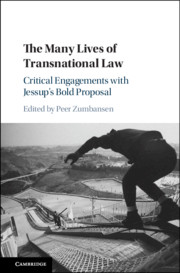Book contents
- Reviews
- The Many Lives of Transnational Law
- The Many Lives of Transnational Law
- Copyright page
- Contents
- Contributors
- Preface and Acknowledgements
- Introduction Transnational Law, with and beyond Jessup
- Part I Transnational Law
- Part II Transnational Law as Regulatory Governance
- Part III Transnational Law
- 13 Locating Private Transnational Authority in the Global Political Economy
- 14 Transnational Law as Drama
- 15 Transnational Law as Unseen Law
- 16 The Cri de Jessup Sixty Years Later
- 17 The Private Life of Transnational Law
- 18 After the Backlash
- Part IV Conclusion
- Index of Names
- Subject Index
17 - The Private Life of Transnational Law
Reading Jessup from the Post-Colony
from Part III - Transnational Law
Published online by Cambridge University Press: 18 March 2020
- Reviews
- The Many Lives of Transnational Law
- The Many Lives of Transnational Law
- Copyright page
- Contents
- Contributors
- Preface and Acknowledgements
- Introduction Transnational Law, with and beyond Jessup
- Part I Transnational Law
- Part II Transnational Law as Regulatory Governance
- Part III Transnational Law
- 13 Locating Private Transnational Authority in the Global Political Economy
- 14 Transnational Law as Drama
- 15 Transnational Law as Unseen Law
- 16 The Cri de Jessup Sixty Years Later
- 17 The Private Life of Transnational Law
- 18 After the Backlash
- Part IV Conclusion
- Index of Names
- Subject Index
Summary
Jessup’s Transnational Law challenges the state as the sole maker of international law. Nevertheless, the doctrine of transnational law advocated for the disrobing of the newly gained sovereignty in Asia and Africa. American corporate lawyers used transnational law to expand their international commercial arbitration practice. Next, in disputes arising from the expropriations by new states of property acquired from concession contracts investors found transnational law profitable. Effectively, Transnational Law, restoring a colonial status quo, facilitated the post-war internationalization of contracts to develop the law of economic protection of aliens. It wantonly focused far too much on “contracts” forgetting conveniently its “concessional” nature. The doctrine of transnational law grew from the McNair-Lauterpacht School of thought that “exploited ungrudgingly and to the full” the “rules” of “private law for the purpose of the development of international law”. The Suez crisis inaugurated the American lawyer's putting of transnational law into practice.
Keywords
- Type
- Chapter
- Information
- The Many Lives of Transnational LawCritical Engagements with Jessup's Bold Proposal, pp. 419 - 440Publisher: Cambridge University PressPrint publication year: 2020

